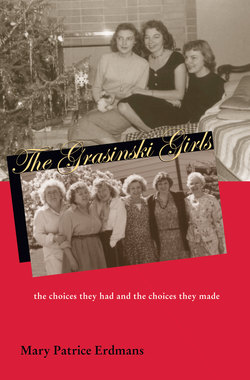Читать книгу The Grasinski Girls - Mary Patrice Erdmans - Страница 10
На сайте Литреса книга снята с продажи.
ОглавлениеSeries Editor’s Preface
HISTORIANS AND SOCIAL SCIENTISTS HAVE studied the male-dominated public side of Polish immigrant and ethnic life that took place in the churches and organizations, in the shops and the factories, on the picket line, and at the ballot box. But few studies have peered into the homes to examine the hidden, inner social world of white ethnic families and communities like those of Polish America and, more specifically, the private lives of the white ethnic women of modest, working-class backgrounds who lived therein.
Through extensive interviews and interactions with five Polish-American sisters—the author’s own aunts and mother—sociologist Mary Patrice Erdmans enters this secret yet signally important world to tell the story of a generation of women who, for the most part, have remained voiceless in both the ethnic and women’s history narratives. In The Grasinski Girls: The Choices They Had and the Choices They Made, Erdmans describes this world as seen through the women’s own eyes, a world of small victories, silent hurts, ordinary pleasures, and, above all, the triumph of survival. Their world, to be sure, was bounded by the structures and strictures of patriarchal relations with their father, their husbands, and their employers, but men remain mostly offstage in this volume. This is, instead, the story of five women and the personal engagement of one Polish-American daughter and sociologist with the lives of these women, who, perhaps without their knowing it, nurtured her own professional ambitions and feminist consciousness.
Professor Erdmans, associate professor of sociology at Central Connecticut State University, also is the author of Opposite Poles: Immigrants and Ethnics in Polish Chicago, 1976–1990. In The Grasinski Girls, Erdmans has written a unique and pathbreaking study of gender, ethnicity, and class that will enlighten scholars, students, and general readers interested in women’s studies, ethnic studies, and the Polish-American experience.
The Grasinski Girls: The Choices They Had and the Choices They Made is the fifth volume in the Ohio University Press Polish and Polish-American Studies Series. The series revisits the historical and contemporary experience of one of America’s largest European ethnic groups and the history of a European homeland that has played a disproportionately important role in twentieth-century and contemporary world affairs. The series aims to publish innovative monographs and more general works that investigate under- or unexplored topics or themes that offer new, critical, revisionist, or comparative perspectives in the area of Polish and Polish-American Studies. Interdisciplinary or multidisciplinary in profile, the series seeks manuscripts on Polish immigration and ethnic communities, the country of origin, and its various peoples in history, anthropology, cultural studies, political economy, current politics, and related fields.
Publication of the Ohio University Press Polish and Polish-American Studies Series marks a milestone in the maturation of the Polish Studies field and stands as a fitting tribute to the scholars and organizations whose efforts have brought it to fruition. Supported by a series advisory board of accomplished Polonists and Polish-Americanists, the Polish and Polish-American Studies Series has been made possible through generous financial assistance from the Polish American Historical Association, the Polish Institute of Arts and Sciences of America, the Stanislaus A. Blejwas Endowed Chair in Polish and Polish American Studies at Central Connecticut State University, Madonna University, and the Piast Institute, and through institutional support from Wayne State University and Ohio University Press. The series meanwhile has benefited from the warm encouragement of a number of persons, including Gillian Berchowitz, M. B. B. Biskupski, the late Stanislaus A. Blejwas, Thomas Gladsky, Thaddeus Gromada, Sister Rose Marie Kujawa, CSSF, James S. Pula, Thaddeus Radzilowski, and David Sanders. The moral and material support from all of these institutions and individuals is gratefully acknowledged.
John J. Bukowczyk
